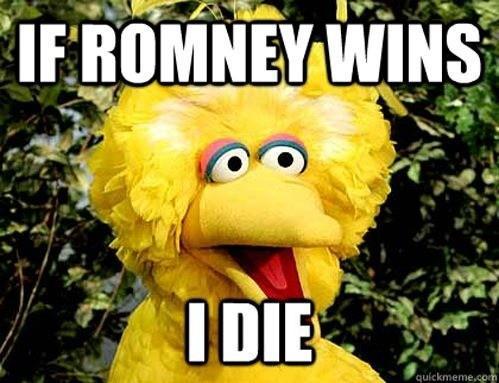
10:31 pm — "I'm concerned about America," says Romney the Moderate. Perhaps what he failed to mention was the 47 percent of it he wrote off in a statement that Obama has sensibly decided not to mention, but in any case, it's a nice sentiment. Romney's making a direct appeal to the camera in what seems to me, sitting at home in New Zealand, like a desperate attempt simply to seem like a human being. He's just making this up as he goes along. The Etch-A-Sketch is back, ladies and gentlemen. Back in force.
10:27 pm — Obama is kind of calling Romney out on the bipartisan thing. And he needs to, because that was really awful. Time for closing statements. "My faith and confidence in the American future is undiminished...and the reason is because of its people." Romney has this awful, insidious little smirk on his face the entire time. Obama is picking things up right now, during his closing statement. I was beginning to think that he had lost it. He has stopped stuttering, and that's something. "I have kept that promise, and if you vote for me, then I promise that I'll fight just as hard in a second term."
10:22 pm — God! Lehrer is dreadful at controlling this thing. He's basically handed control over to Romney. Tweet of the night on the subject:
10:17 pm — The first mention of religious freedom. And the military. God and guns, please. That's what freedom looks like.
10:13 pm — "Do you believe there is a fundamental between the two of you as to how you view the mission of the federal government." According to Obama, the first rule is to keep the American people safe. "As Lincoln understood, there are some things we do better together." Even on this topic, which he knows so well, and he understands so acutely, he is lacking the fluency of his earlier arguments. Obama is an excellent orator, but it isn't coming through here. Invoking Lincoln was a good idea. Obama has said earlier that Lincoln is, in fact, his favourite president.
10:10 pm — And the non-specificity card gets played.
10:02 pm — It's awfully funny to hear Romney talk about an Obama/Democratic unwillingness to come together and be bipartisan. You can't blame Obama for Republican obstructionism. The GOP, from the very beginning, was determined to oppose Obama at every turn. Obama should be able to walk all over this, and yet he's stumbling and staggering. I simply cannot believe for a moment that the lack of bipartisan cooperation is Obama's fault, or that Romney is in any way a better team player.
9:59 pm — I'm not a rabid Democrat, and I know it's not his style, but I really want Obama to tear into Romney at the moment. I just can't knock the feeling that he's letting this slip. As Frum observes, "Romney consistently looks at Obama when Obama speaks. Obama looks down when ROmney speaks. Not alpha dog behaviour."
9:57 pm — Obama's taking on the regulation point at the moment, but he's doing a terrible job. Romney is coming off as the moderate here! Incredibly. His Dodd-Frank rhetoric is actually making sense and coming across as reasonable. Obama: "Is there anyone out there who thinks we have too much oversight and regulation on Wall Street? If so, Romney is your candidate." Lehrer says we've achieved a clear difference. Not really.
9:54 pm — "Regulation can become excessive." And apparently you have to have regulation. I don't think Romney's conservative friends are going to buy this, or at least not the current Republican Party. On the other hand, it's nice to know that Romney's kind of restricted regulation is there to guard us from the panoply of garage banks that would undoubtedly appear in its absence.
9:51 pm — I'm feeling for Jim Lehrer at the moment.
9:46 pm — This is a concerning episode for those of us who like Obama. The truth is that he's rambling. He's being dreadfully abstract, and needs to focus if he's going to count this one as a victory. That said, these debates don't really mean that much in determining the outcome of the election. They're just circuses for us to gawk at while we wait for November. That said, though, this is probably one of the most substantiative debates we've seen during this election cycle. We're getting into gritty specifics. You never saw this during the GOP debates. But Romney's clarity is really too good. Obama needs to lift it.
9:38 pm — Just tuned in on CNN. Hoping to provide updates throughout.
(Image via
Politico)











